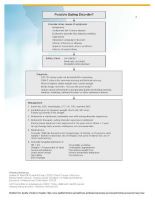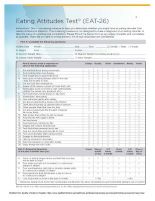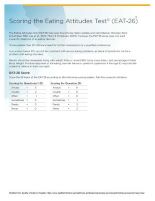Introduction and Overview
The following resources are widely used in clinical settings to screen and assess, design treatment protocol, prescribe medication and provide referrals for children and adolescents with eating disorders.
Screening & Assessment
Flowchart to guide the process of considering possible eating disorder.
Popular screening instrument.
Screening tool used by NEDA.
Treatment
Cognitive Behavioral Therapy (CBT): A common therapy for individuals with eating disorders. CBT is a type of talk therapy focusing on how thoughts and emotions affect behavior.
- A Cognitive Behavioral Therapy Workbook for Children & Adolescents
- How is Cognitive Behavioral Therapy (CBT) Different for Kids?
Family-Based Treatment
Referral and Co-Management
n/a
Medication
n/a
Billing/Coding
n/a
Additional Resources for Families
Websites
National Eating Disorders Association: Dedicated to supporting individuals and families affected by eating disorders. They provide information, screening tools, and referrals.
Maudsley Parents: A family-based treatment that offers hope, help, and information to other families.
Academy for Eating Disorders: A professional organization committed to research, education, treatment, and prevention.
F.E.A.S.T.: The global support and education community of and for parents of those with eating disorders. They also have a robust community forum.
Seattle Children’s Hospital: Eating disorder book list and resources.
Podcast
Peace Meal: Is an eating disorder podcast hosted by The Emily Program.
The Eating Disorder Recovery Podcast: Healing your relationship with food, your body and your self.
ED Matters: Interviews experts in the field of eating disorders.
Search under eating disorders on your favorite podcast hosting site for more.
Apps
Healthline: Highlights the best apps for supporting eating disorder recovery. They are listed below.
- Recovery Record: Eating disorder management.
- Rise Up + Recover: An eating disorder monitoring and management tool for anorexia, bulimia, binge eating and EDNOS.
- RealifeChange: A personal, portable life coach.
- MindShift CBT : Anxiety Canada teaches you how to relax and take charge of your anxiety.
- What's Up? A Mental Health App.
- Cognitive Diary: Cognitive behavioral therapy self-help.
Fact Sheets
6 Common Types of Eating Disorders and (Their Symptoms).
NEDA's What is an eating disorder?
Eating Disorders: About More than Food: National Institute on Mental Health provides an overview of the behavioral health components of eating disorders.
Articles
Helping Someone with an Eating Disorder: Help Guide reviews types of eating disorders, common myths, and techniques for supporting someone in your life with an eating disorder.
Stories of Hope: National Eating Disorder Association provides personal stories from eating disorder survivors.
You Can’t Save Your Child from Their Anorexia: Psychology Today shares a story of a mother’s struggles with her daughter's eating disorder.
Books
Books families may find helpful:
Helping Your Child Overcome an Eating Disorder: What You Can Do at Home (2003), by Teachman, Schwartz, Gordic and Coyle
Help Your Teenager Beat an Eating Disorder (2004), by James Lock and Daniel le Grange
Effective Meal Support: A Guide for Family and Friends, by British Colombia Children’s Hospital and Seattle Children’s Hospital
Off the C.U.F.F. (Calm, Unwavering, Firm and Funny) by Duke Eating Disorders Program, order info at www.dukehealth.org/treatments/psychiatry/eating-disorders
Life Without Ed: How One Woman Declared Independence from Her Eating Disorder andHow You Can Too (2003), by Jenni Schaefer and Thom Rutledge
Books youth may find helpful:
Eating Disorders (2003), by Trudi Strain Trueit
No Body’s Perfect (2002), by Kimberley Kirberger
Book Riot highlights the 50 must-read books about eating disorders.
Videos
National Eating Disorders Association reviews the common signs and symptoms of eating disorders.
View all of NEDA's videos on YouTube.







